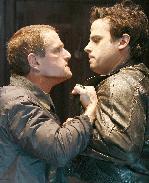SEARCH
REVIEWS
FEATURES
NEWS
Etcetera and
Short Term Listings
LISTINGS
Broadway
Off-Broadway
NYC Restaurants
BOOKS and CDs
OTHER PLACES
Berkshires
London
California
New Jersey
DC
Philadelphia
Elsewhere
QUOTES
TKTS
PLAYWRIGHTS' ALBUMS
LETTERS TO EDITOR
FILM
LINKS
MISCELLANEOUS
Free Updates
Masthead
Writing for Us
A CurtainUp Review
Defender of the Faith
By Elyse Sommer
|
I just think my time is up. It's like a big black crow sittin' on my shoulder. . — Barney, the farmhand suspected of being an informer. It is said that if you raped your next-door neighbor, it will soon be forgotten; if you grandfather had been an INFORMER you would be an outcast.—program note excerpt from Talking to the People of South Armagh by Robert Nairac. |

David Lansbury and Luke Kirby in Defender of the Faith
(Photo: Carol Rosegg) |
Though Defender of the Faith is set in the same era as Martin McDonagh's The Lieutenant of Inishmore, don't expect the sort of black comedy with which McDonagh imbues his plays. The darkness that permeates Defender is unremittingly grim with its , focus on how conflicts like the long period of violence that so long devastated Northern Ireland can destroy a community, rip family and friendship ties asunder and cause ordinary humans to behave like depraved animals.
The play is well served by director Ciarán O'Reilly's understated build-up of the explosive nervousness on the farm straddling the border of Northern and Southern Ireland and the all male six-member ensemble. It takes a bit for American ears to adjust to the thick Irish accents but not too long to catch on to the cracks in set designer Charles Corcoran's finely detailed, painterly recreation of a modest farmhouse kitchen which also flips around for several scenes in the farm's barn with its decidedly less than state of the art equipment.
A chain link fence at one side of the kitchen and Zachary Williamson's evocative sound design serve as menacing reminder of the conflict overarching the dailyness of the character's lives. As we sort out who's who —the gruff head of the household known only as Father (Anto Nolan), his two sons, young Danny (Matt Ball) and older brother Thomas (Luke Kirby)— we also become attuned to the tragic events (another brother's death a year earlier and the mother's confinement to a mental institution) that probably have more than a little to do with the uneasy relationship between the father and the older son. That relationship takes on an icy, dangerous edge with the arrival of J.J. (David Landsbury), an Irish Republican Army operative who's come to sniff out an Informer or "tout" responsible for a failed bombing.
Except for the violent last twenty minutes or so, the drama moves along quietly but it's that very quiet that makes the suspense palpable. The standout in the excellent ensemble and its pivotal character is Luke Kirby as the young man whose despair and suspicion vis-a-vis his brother's death leads to an ending that seems to aspire to Greek tragedy and a final scene that leaves lots of unanswered questions.
Happily, the long festering " troubles" have ended, thanks to a healthy and growing economy. However, the bitter memories of those days have undoubtedly left an indelible mark on those who lived through them and, sadly, seemingly insoluble conflicts in other parts of the world give stories like this constant new meaning.
|
DEFENDER OF THE FAITH By Stuart Carolan Directed by Ciarán O'Reily. Cast: Matt Bal. (Danny)l, Luke Kirby (Thomas), David Lansbury (J.J.), Anto Nolan (Father), Peter Rogan (Barney), Marc Aden Gray (Unknown Man) Sets: Charlie Corcoran Costumes: Martha Hally Lighting: Brian Nason Sound: Zachary Williamson Dialect Coach: Stephen Gabis Running Time: 90 minutes without intermission >Irish Repertory Theatre 132 West 22nd Street. (212) 727-2737 www.irishrep.org From 3/01/07 to 4/29/07; opening 3/08/07. Tue - Sat at 8pm; Wed, Sat, Sun at 3pm Tickets: $55-$60 Reviewed by Elyse Sommer at March 7th matinee |

Easy-on-the budget super gift for yourself and your musical loving friends. Tons of gorgeous pictures.

Leonard Maltin's 2007 Movie Guide

At This Theater
Leonard Maltin's 2005 Movie Guide

 >
>

